Narrow and Broader Views of Corporate Social Responsibility and Ethics
VerifiedAdded on 2023/06/07
|9
|2730
|55
AI Summary
This report analyses the narrow and broader views of corporate social responsibility and ethics, and the fine line between corporate social responsibility and virtue signalling. It also discusses the statement made by Tony Abbott and the importance of ethical business practices and corporate governance.
Contribute Materials
Your contribution can guide someone’s learning journey. Share your
documents today.
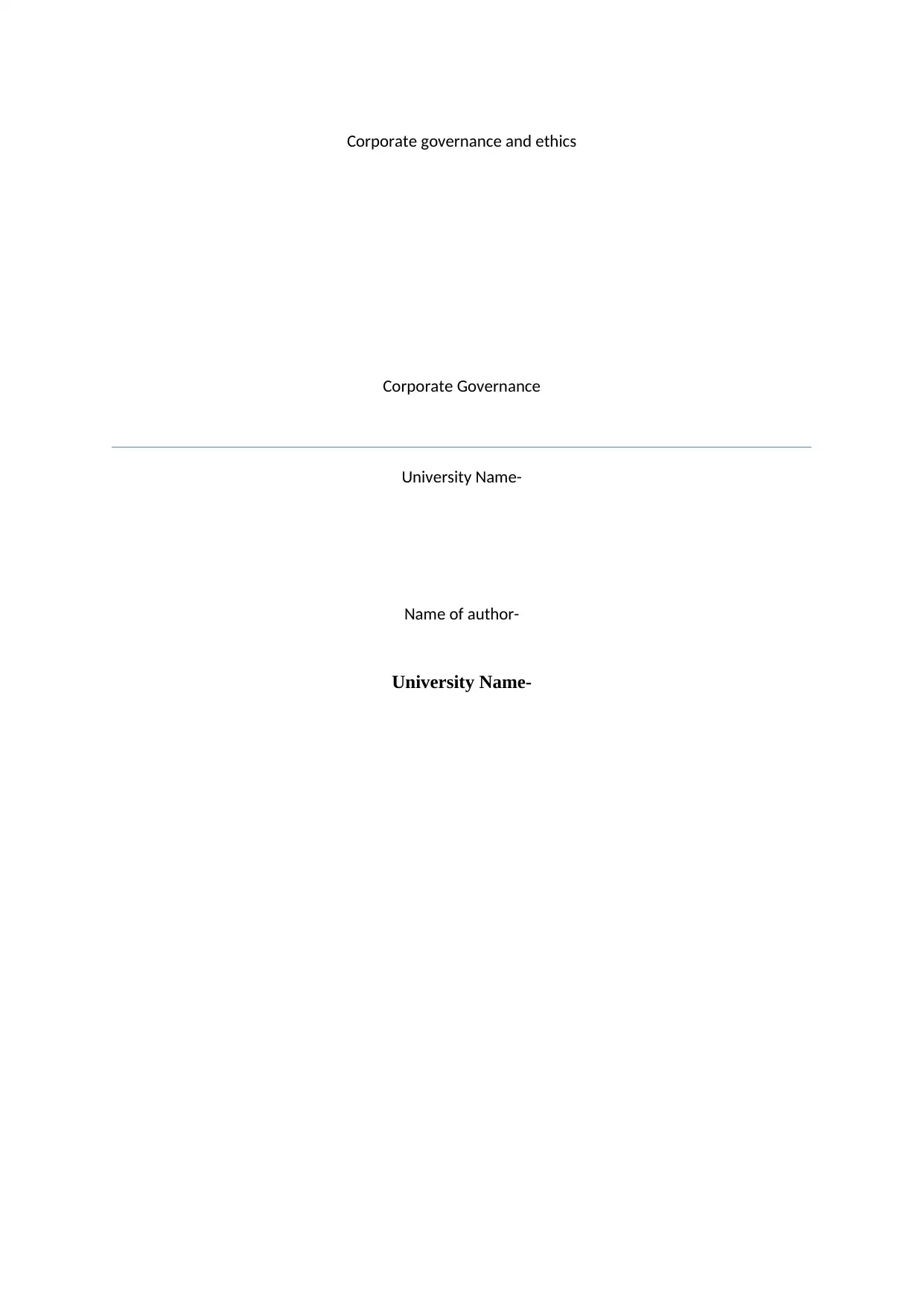
Corporate governance and ethics
Corporate Governance
University Name-
Name of author-
University Name-
Corporate Governance
University Name-
Name of author-
University Name-
Secure Best Marks with AI Grader
Need help grading? Try our AI Grader for instant feedback on your assignments.
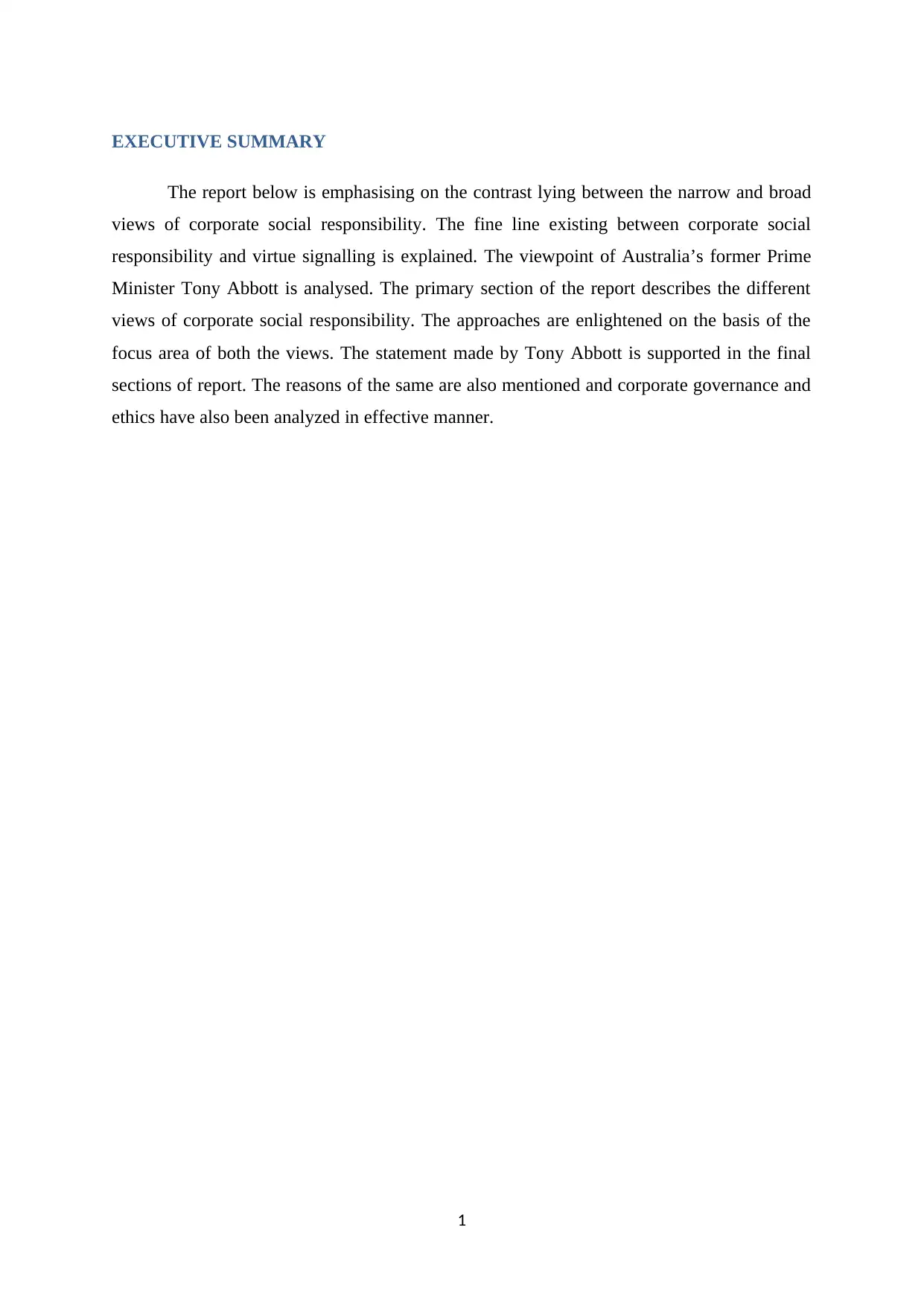
EXECUTIVE SUMMARY
The report below is emphasising on the contrast lying between the narrow and broad
views of corporate social responsibility. The fine line existing between corporate social
responsibility and virtue signalling is explained. The viewpoint of Australia’s former Prime
Minister Tony Abbott is analysed. The primary section of the report describes the different
views of corporate social responsibility. The approaches are enlightened on the basis of the
focus area of both the views. The statement made by Tony Abbott is supported in the final
sections of report. The reasons of the same are also mentioned and corporate governance and
ethics have also been analyzed in effective manner.
1
The report below is emphasising on the contrast lying between the narrow and broad
views of corporate social responsibility. The fine line existing between corporate social
responsibility and virtue signalling is explained. The viewpoint of Australia’s former Prime
Minister Tony Abbott is analysed. The primary section of the report describes the different
views of corporate social responsibility. The approaches are enlightened on the basis of the
focus area of both the views. The statement made by Tony Abbott is supported in the final
sections of report. The reasons of the same are also mentioned and corporate governance and
ethics have also been analyzed in effective manner.
1
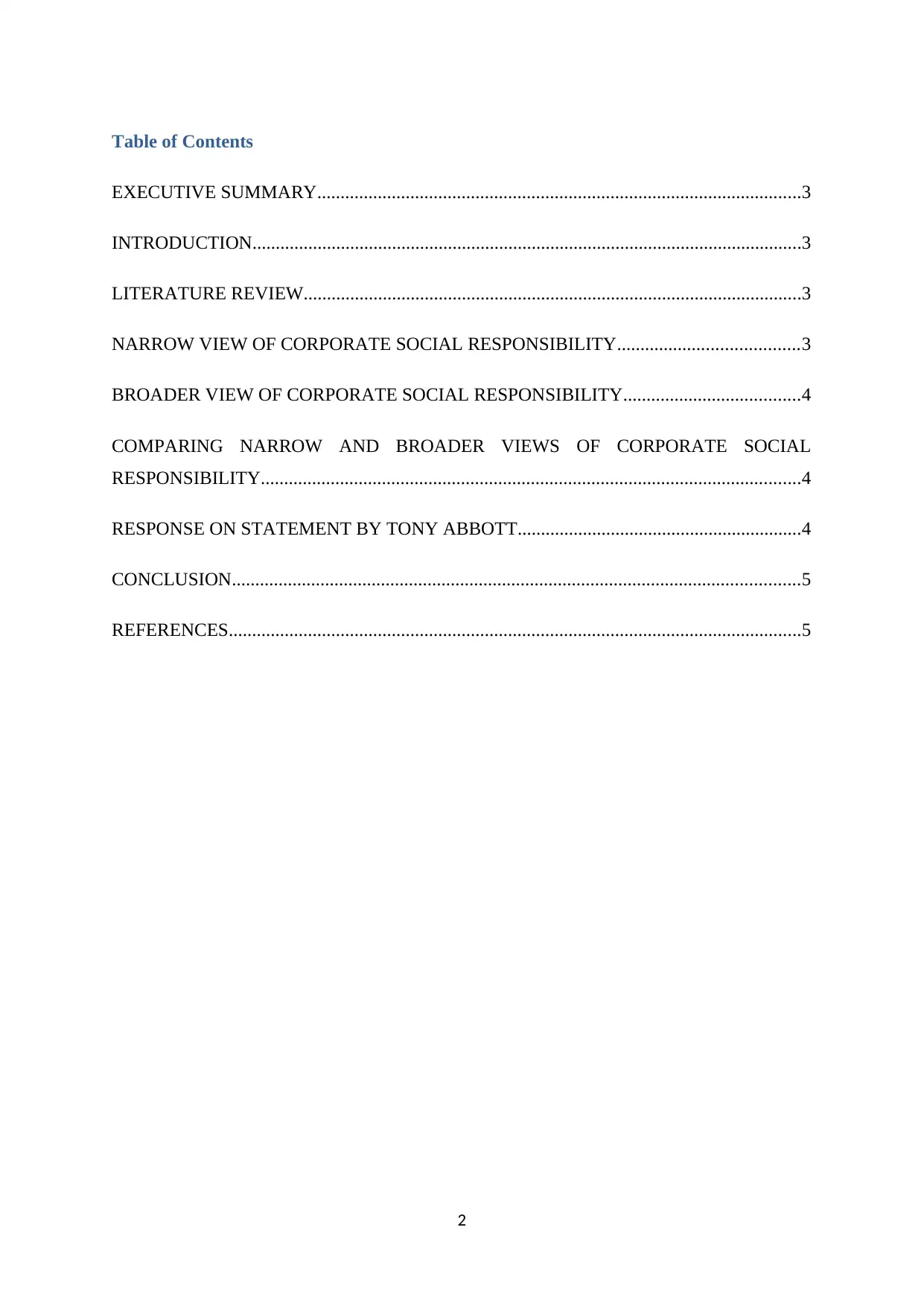
Table of Contents
EXECUTIVE SUMMARY........................................................................................................3
INTRODUCTION......................................................................................................................3
LITERATURE REVIEW...........................................................................................................3
NARROW VIEW OF CORPORATE SOCIAL RESPONSIBILITY.......................................3
BROADER VIEW OF CORPORATE SOCIAL RESPONSIBILITY......................................4
COMPARING NARROW AND BROADER VIEWS OF CORPORATE SOCIAL
RESPONSIBILITY....................................................................................................................4
RESPONSE ON STATEMENT BY TONY ABBOTT.............................................................4
CONCLUSION..........................................................................................................................5
REFERENCES...........................................................................................................................5
2
EXECUTIVE SUMMARY........................................................................................................3
INTRODUCTION......................................................................................................................3
LITERATURE REVIEW...........................................................................................................3
NARROW VIEW OF CORPORATE SOCIAL RESPONSIBILITY.......................................3
BROADER VIEW OF CORPORATE SOCIAL RESPONSIBILITY......................................4
COMPARING NARROW AND BROADER VIEWS OF CORPORATE SOCIAL
RESPONSIBILITY....................................................................................................................4
RESPONSE ON STATEMENT BY TONY ABBOTT.............................................................4
CONCLUSION..........................................................................................................................5
REFERENCES...........................................................................................................................5
2
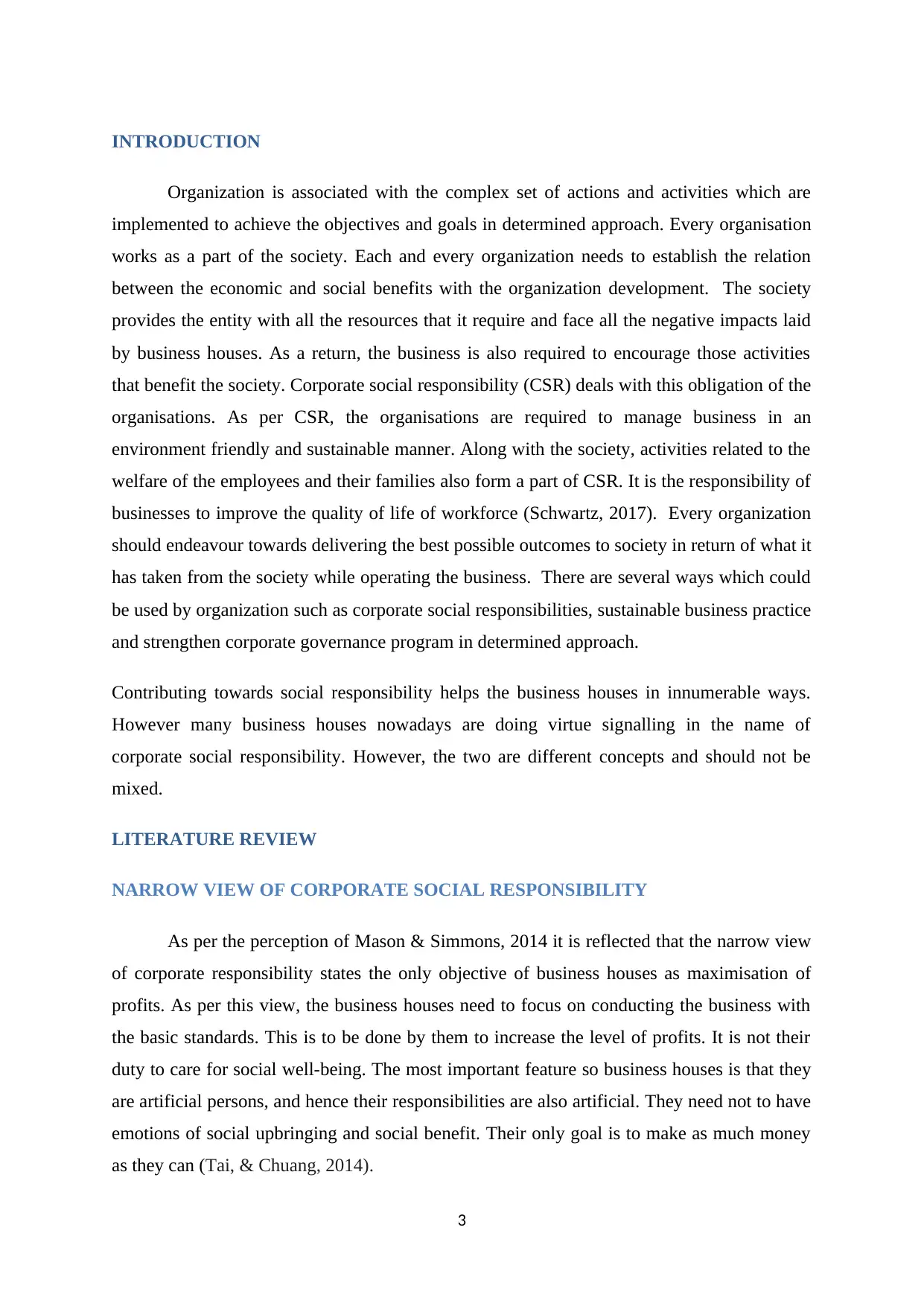
INTRODUCTION
Organization is associated with the complex set of actions and activities which are
implemented to achieve the objectives and goals in determined approach. Every organisation
works as a part of the society. Each and every organization needs to establish the relation
between the economic and social benefits with the organization development. The society
provides the entity with all the resources that it require and face all the negative impacts laid
by business houses. As a return, the business is also required to encourage those activities
that benefit the society. Corporate social responsibility (CSR) deals with this obligation of the
organisations. As per CSR, the organisations are required to manage business in an
environment friendly and sustainable manner. Along with the society, activities related to the
welfare of the employees and their families also form a part of CSR. It is the responsibility of
businesses to improve the quality of life of workforce (Schwartz, 2017). Every organization
should endeavour towards delivering the best possible outcomes to society in return of what it
has taken from the society while operating the business. There are several ways which could
be used by organization such as corporate social responsibilities, sustainable business practice
and strengthen corporate governance program in determined approach.
Contributing towards social responsibility helps the business houses in innumerable ways.
However many business houses nowadays are doing virtue signalling in the name of
corporate social responsibility. However, the two are different concepts and should not be
mixed.
LITERATURE REVIEW
NARROW VIEW OF CORPORATE SOCIAL RESPONSIBILITY
As per the perception of Mason & Simmons, 2014 it is reflected that the narrow view
of corporate responsibility states the only objective of business houses as maximisation of
profits. As per this view, the business houses need to focus on conducting the business with
the basic standards. This is to be done by them to increase the level of profits. It is not their
duty to care for social well-being. The most important feature so business houses is that they
are artificial persons, and hence their responsibilities are also artificial. They need not to have
emotions of social upbringing and social benefit. Their only goal is to make as much money
as they can (Tai, & Chuang, 2014).
3
Organization is associated with the complex set of actions and activities which are
implemented to achieve the objectives and goals in determined approach. Every organisation
works as a part of the society. Each and every organization needs to establish the relation
between the economic and social benefits with the organization development. The society
provides the entity with all the resources that it require and face all the negative impacts laid
by business houses. As a return, the business is also required to encourage those activities
that benefit the society. Corporate social responsibility (CSR) deals with this obligation of the
organisations. As per CSR, the organisations are required to manage business in an
environment friendly and sustainable manner. Along with the society, activities related to the
welfare of the employees and their families also form a part of CSR. It is the responsibility of
businesses to improve the quality of life of workforce (Schwartz, 2017). Every organization
should endeavour towards delivering the best possible outcomes to society in return of what it
has taken from the society while operating the business. There are several ways which could
be used by organization such as corporate social responsibilities, sustainable business practice
and strengthen corporate governance program in determined approach.
Contributing towards social responsibility helps the business houses in innumerable ways.
However many business houses nowadays are doing virtue signalling in the name of
corporate social responsibility. However, the two are different concepts and should not be
mixed.
LITERATURE REVIEW
NARROW VIEW OF CORPORATE SOCIAL RESPONSIBILITY
As per the perception of Mason & Simmons, 2014 it is reflected that the narrow view
of corporate responsibility states the only objective of business houses as maximisation of
profits. As per this view, the business houses need to focus on conducting the business with
the basic standards. This is to be done by them to increase the level of profits. It is not their
duty to care for social well-being. The most important feature so business houses is that they
are artificial persons, and hence their responsibilities are also artificial. They need not to have
emotions of social upbringing and social benefit. Their only goal is to make as much money
as they can (Tai, & Chuang, 2014).
3
Secure Best Marks with AI Grader
Need help grading? Try our AI Grader for instant feedback on your assignments.
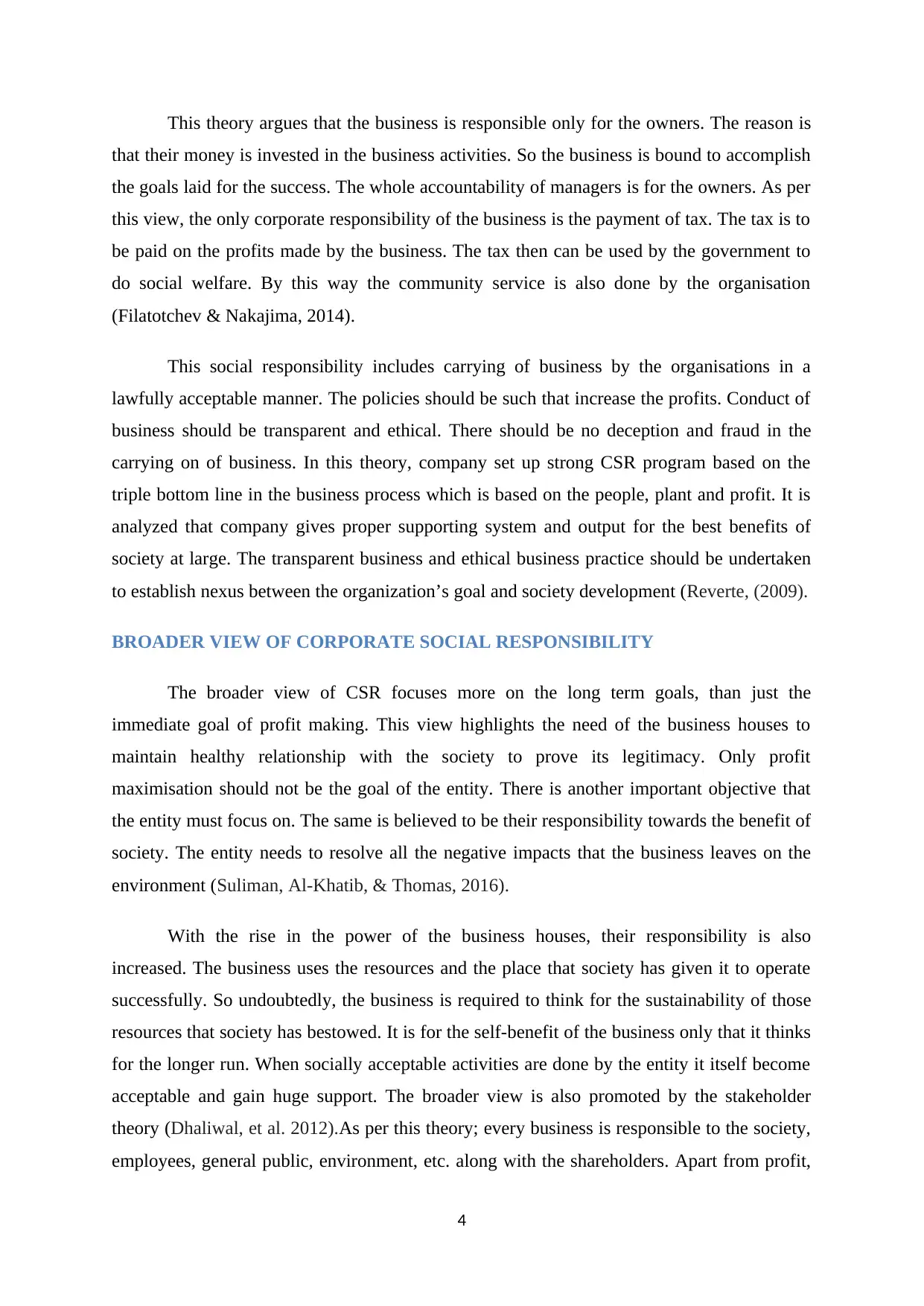
This theory argues that the business is responsible only for the owners. The reason is
that their money is invested in the business activities. So the business is bound to accomplish
the goals laid for the success. The whole accountability of managers is for the owners. As per
this view, the only corporate responsibility of the business is the payment of tax. The tax is to
be paid on the profits made by the business. The tax then can be used by the government to
do social welfare. By this way the community service is also done by the organisation
(Filatotchev & Nakajima, 2014).
This social responsibility includes carrying of business by the organisations in a
lawfully acceptable manner. The policies should be such that increase the profits. Conduct of
business should be transparent and ethical. There should be no deception and fraud in the
carrying on of business. In this theory, company set up strong CSR program based on the
triple bottom line in the business process which is based on the people, plant and profit. It is
analyzed that company gives proper supporting system and output for the best benefits of
society at large. The transparent business and ethical business practice should be undertaken
to establish nexus between the organization’s goal and society development (Reverte, (2009).
BROADER VIEW OF CORPORATE SOCIAL RESPONSIBILITY
The broader view of CSR focuses more on the long term goals, than just the
immediate goal of profit making. This view highlights the need of the business houses to
maintain healthy relationship with the society to prove its legitimacy. Only profit
maximisation should not be the goal of the entity. There is another important objective that
the entity must focus on. The same is believed to be their responsibility towards the benefit of
society. The entity needs to resolve all the negative impacts that the business leaves on the
environment (Suliman, Al-Khatib, & Thomas, 2016).
With the rise in the power of the business houses, their responsibility is also
increased. The business uses the resources and the place that society has given it to operate
successfully. So undoubtedly, the business is required to think for the sustainability of those
resources that society has bestowed. It is for the self-benefit of the business only that it thinks
for the longer run. When socially acceptable activities are done by the entity it itself become
acceptable and gain huge support. The broader view is also promoted by the stakeholder
theory (Dhaliwal, et al. 2012).As per this theory; every business is responsible to the society,
employees, general public, environment, etc. along with the shareholders. Apart from profit,
4
that their money is invested in the business activities. So the business is bound to accomplish
the goals laid for the success. The whole accountability of managers is for the owners. As per
this view, the only corporate responsibility of the business is the payment of tax. The tax is to
be paid on the profits made by the business. The tax then can be used by the government to
do social welfare. By this way the community service is also done by the organisation
(Filatotchev & Nakajima, 2014).
This social responsibility includes carrying of business by the organisations in a
lawfully acceptable manner. The policies should be such that increase the profits. Conduct of
business should be transparent and ethical. There should be no deception and fraud in the
carrying on of business. In this theory, company set up strong CSR program based on the
triple bottom line in the business process which is based on the people, plant and profit. It is
analyzed that company gives proper supporting system and output for the best benefits of
society at large. The transparent business and ethical business practice should be undertaken
to establish nexus between the organization’s goal and society development (Reverte, (2009).
BROADER VIEW OF CORPORATE SOCIAL RESPONSIBILITY
The broader view of CSR focuses more on the long term goals, than just the
immediate goal of profit making. This view highlights the need of the business houses to
maintain healthy relationship with the society to prove its legitimacy. Only profit
maximisation should not be the goal of the entity. There is another important objective that
the entity must focus on. The same is believed to be their responsibility towards the benefit of
society. The entity needs to resolve all the negative impacts that the business leaves on the
environment (Suliman, Al-Khatib, & Thomas, 2016).
With the rise in the power of the business houses, their responsibility is also
increased. The business uses the resources and the place that society has given it to operate
successfully. So undoubtedly, the business is required to think for the sustainability of those
resources that society has bestowed. It is for the self-benefit of the business only that it thinks
for the longer run. When socially acceptable activities are done by the entity it itself become
acceptable and gain huge support. The broader view is also promoted by the stakeholder
theory (Dhaliwal, et al. 2012).As per this theory; every business is responsible to the society,
employees, general public, environment, etc. along with the shareholders. Apart from profit,
4
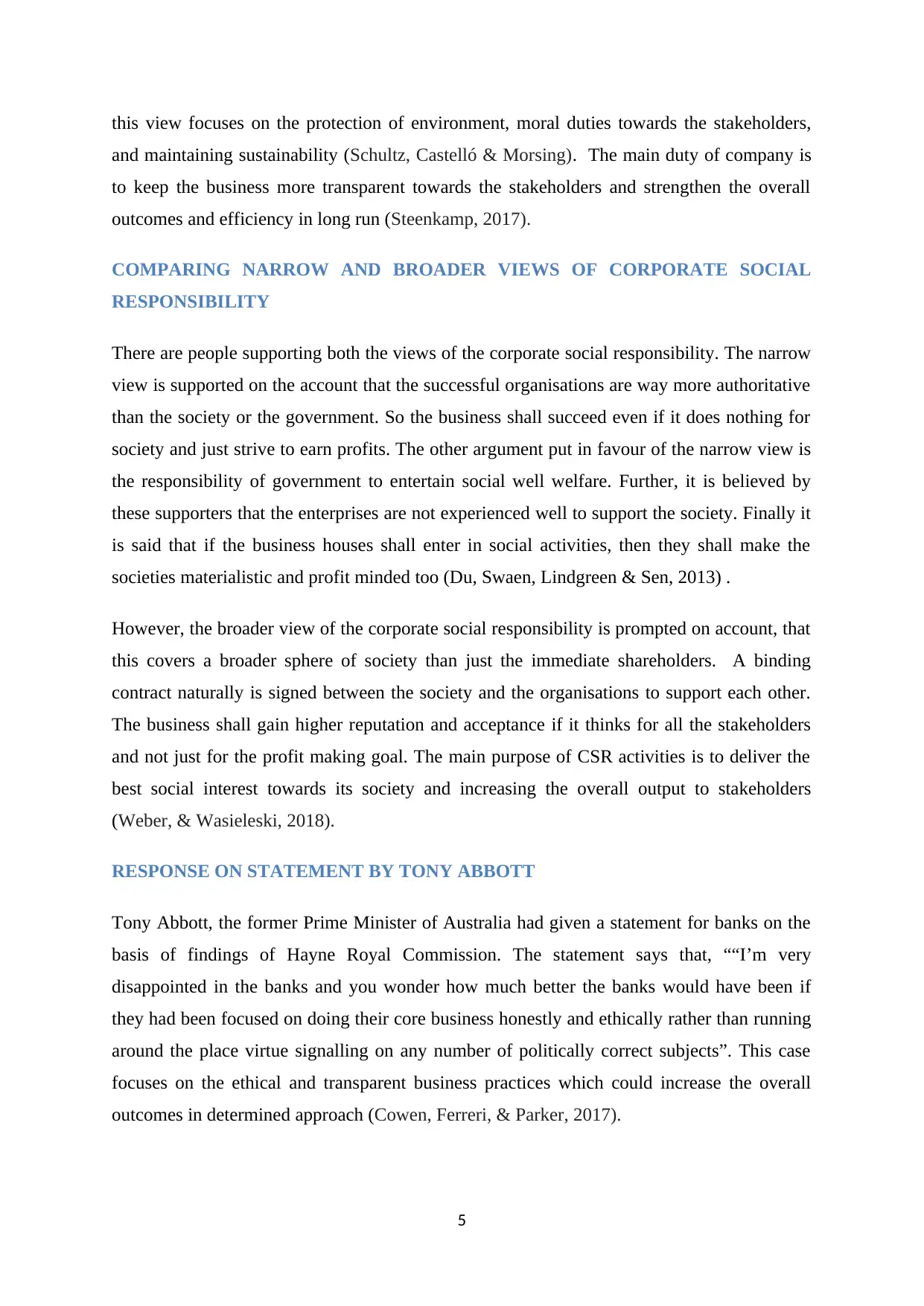
this view focuses on the protection of environment, moral duties towards the stakeholders,
and maintaining sustainability (Schultz, Castelló & Morsing). The main duty of company is
to keep the business more transparent towards the stakeholders and strengthen the overall
outcomes and efficiency in long run (Steenkamp, 2017).
COMPARING NARROW AND BROADER VIEWS OF CORPORATE SOCIAL
RESPONSIBILITY
There are people supporting both the views of the corporate social responsibility. The narrow
view is supported on the account that the successful organisations are way more authoritative
than the society or the government. So the business shall succeed even if it does nothing for
society and just strive to earn profits. The other argument put in favour of the narrow view is
the responsibility of government to entertain social well welfare. Further, it is believed by
these supporters that the enterprises are not experienced well to support the society. Finally it
is said that if the business houses shall enter in social activities, then they shall make the
societies materialistic and profit minded too (Du, Swaen, Lindgreen & Sen, 2013) .
However, the broader view of the corporate social responsibility is prompted on account, that
this covers a broader sphere of society than just the immediate shareholders. A binding
contract naturally is signed between the society and the organisations to support each other.
The business shall gain higher reputation and acceptance if it thinks for all the stakeholders
and not just for the profit making goal. The main purpose of CSR activities is to deliver the
best social interest towards its society and increasing the overall output to stakeholders
(Weber, & Wasieleski, 2018).
RESPONSE ON STATEMENT BY TONY ABBOTT
Tony Abbott, the former Prime Minister of Australia had given a statement for banks on the
basis of findings of Hayne Royal Commission. The statement says that, ““I’m very
disappointed in the banks and you wonder how much better the banks would have been if
they had been focused on doing their core business honestly and ethically rather than running
around the place virtue signalling on any number of politically correct subjects”. This case
focuses on the ethical and transparent business practices which could increase the overall
outcomes in determined approach (Cowen, Ferreri, & Parker, 2017).
5
and maintaining sustainability (Schultz, Castelló & Morsing). The main duty of company is
to keep the business more transparent towards the stakeholders and strengthen the overall
outcomes and efficiency in long run (Steenkamp, 2017).
COMPARING NARROW AND BROADER VIEWS OF CORPORATE SOCIAL
RESPONSIBILITY
There are people supporting both the views of the corporate social responsibility. The narrow
view is supported on the account that the successful organisations are way more authoritative
than the society or the government. So the business shall succeed even if it does nothing for
society and just strive to earn profits. The other argument put in favour of the narrow view is
the responsibility of government to entertain social well welfare. Further, it is believed by
these supporters that the enterprises are not experienced well to support the society. Finally it
is said that if the business houses shall enter in social activities, then they shall make the
societies materialistic and profit minded too (Du, Swaen, Lindgreen & Sen, 2013) .
However, the broader view of the corporate social responsibility is prompted on account, that
this covers a broader sphere of society than just the immediate shareholders. A binding
contract naturally is signed between the society and the organisations to support each other.
The business shall gain higher reputation and acceptance if it thinks for all the stakeholders
and not just for the profit making goal. The main purpose of CSR activities is to deliver the
best social interest towards its society and increasing the overall output to stakeholders
(Weber, & Wasieleski, 2018).
RESPONSE ON STATEMENT BY TONY ABBOTT
Tony Abbott, the former Prime Minister of Australia had given a statement for banks on the
basis of findings of Hayne Royal Commission. The statement says that, ““I’m very
disappointed in the banks and you wonder how much better the banks would have been if
they had been focused on doing their core business honestly and ethically rather than running
around the place virtue signalling on any number of politically correct subjects”. This case
focuses on the ethical and transparent business practices which could increase the overall
outcomes in determined approach (Cowen, Ferreri, & Parker, 2017).
5
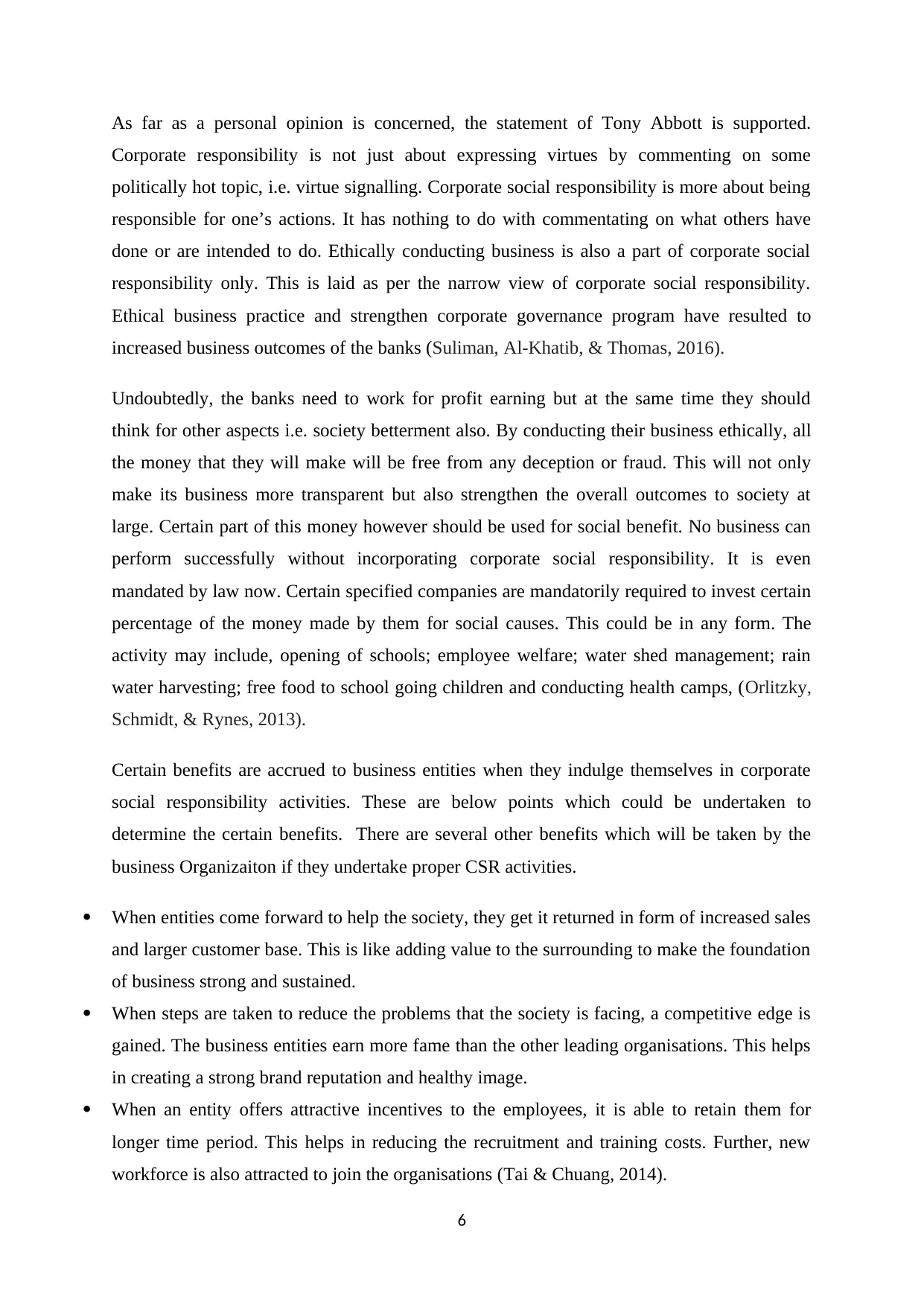
As far as a personal opinion is concerned, the statement of Tony Abbott is supported.
Corporate responsibility is not just about expressing virtues by commenting on some
politically hot topic, i.e. virtue signalling. Corporate social responsibility is more about being
responsible for one’s actions. It has nothing to do with commentating on what others have
done or are intended to do. Ethically conducting business is also a part of corporate social
responsibility only. This is laid as per the narrow view of corporate social responsibility.
Ethical business practice and strengthen corporate governance program have resulted to
increased business outcomes of the banks (Suliman, Al-Khatib, & Thomas, 2016).
Undoubtedly, the banks need to work for profit earning but at the same time they should
think for other aspects i.e. society betterment also. By conducting their business ethically, all
the money that they will make will be free from any deception or fraud. This will not only
make its business more transparent but also strengthen the overall outcomes to society at
large. Certain part of this money however should be used for social benefit. No business can
perform successfully without incorporating corporate social responsibility. It is even
mandated by law now. Certain specified companies are mandatorily required to invest certain
percentage of the money made by them for social causes. This could be in any form. The
activity may include, opening of schools; employee welfare; water shed management; rain
water harvesting; free food to school going children and conducting health camps, (Orlitzky,
Schmidt, & Rynes, 2013).
Certain benefits are accrued to business entities when they indulge themselves in corporate
social responsibility activities. These are below points which could be undertaken to
determine the certain benefits. There are several other benefits which will be taken by the
business Organizaiton if they undertake proper CSR activities.
When entities come forward to help the society, they get it returned in form of increased sales
and larger customer base. This is like adding value to the surrounding to make the foundation
of business strong and sustained.
When steps are taken to reduce the problems that the society is facing, a competitive edge is
gained. The business entities earn more fame than the other leading organisations. This helps
in creating a strong brand reputation and healthy image.
When an entity offers attractive incentives to the employees, it is able to retain them for
longer time period. This helps in reducing the recruitment and training costs. Further, new
workforce is also attracted to join the organisations (Tai & Chuang, 2014).
6
Corporate responsibility is not just about expressing virtues by commenting on some
politically hot topic, i.e. virtue signalling. Corporate social responsibility is more about being
responsible for one’s actions. It has nothing to do with commentating on what others have
done or are intended to do. Ethically conducting business is also a part of corporate social
responsibility only. This is laid as per the narrow view of corporate social responsibility.
Ethical business practice and strengthen corporate governance program have resulted to
increased business outcomes of the banks (Suliman, Al-Khatib, & Thomas, 2016).
Undoubtedly, the banks need to work for profit earning but at the same time they should
think for other aspects i.e. society betterment also. By conducting their business ethically, all
the money that they will make will be free from any deception or fraud. This will not only
make its business more transparent but also strengthen the overall outcomes to society at
large. Certain part of this money however should be used for social benefit. No business can
perform successfully without incorporating corporate social responsibility. It is even
mandated by law now. Certain specified companies are mandatorily required to invest certain
percentage of the money made by them for social causes. This could be in any form. The
activity may include, opening of schools; employee welfare; water shed management; rain
water harvesting; free food to school going children and conducting health camps, (Orlitzky,
Schmidt, & Rynes, 2013).
Certain benefits are accrued to business entities when they indulge themselves in corporate
social responsibility activities. These are below points which could be undertaken to
determine the certain benefits. There are several other benefits which will be taken by the
business Organizaiton if they undertake proper CSR activities.
When entities come forward to help the society, they get it returned in form of increased sales
and larger customer base. This is like adding value to the surrounding to make the foundation
of business strong and sustained.
When steps are taken to reduce the problems that the society is facing, a competitive edge is
gained. The business entities earn more fame than the other leading organisations. This helps
in creating a strong brand reputation and healthy image.
When an entity offers attractive incentives to the employees, it is able to retain them for
longer time period. This helps in reducing the recruitment and training costs. Further, new
workforce is also attracted to join the organisations (Tai & Chuang, 2014).
6
Paraphrase This Document
Need a fresh take? Get an instant paraphrase of this document with our AI Paraphraser
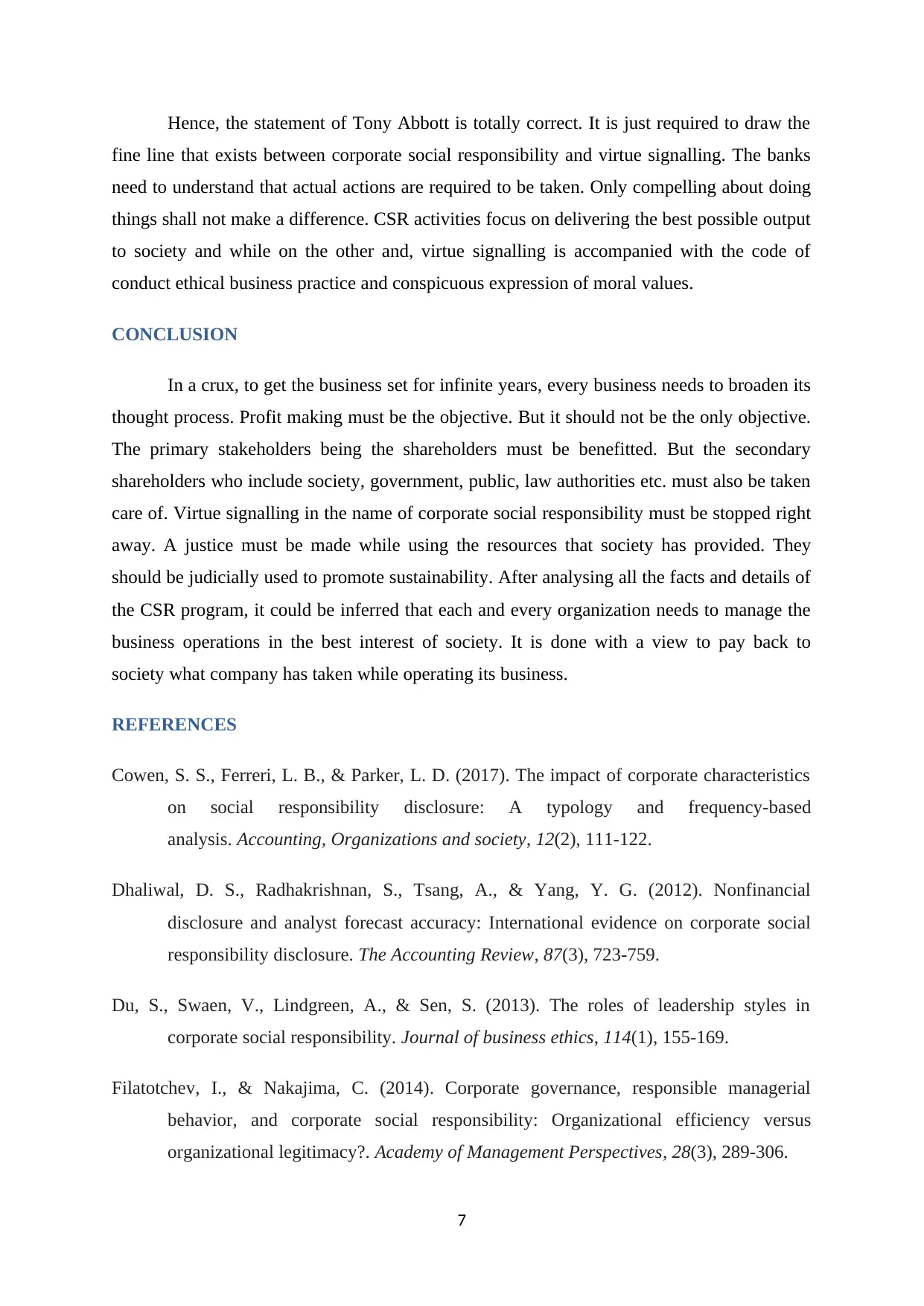
Hence, the statement of Tony Abbott is totally correct. It is just required to draw the
fine line that exists between corporate social responsibility and virtue signalling. The banks
need to understand that actual actions are required to be taken. Only compelling about doing
things shall not make a difference. CSR activities focus on delivering the best possible output
to society and while on the other and, virtue signalling is accompanied with the code of
conduct ethical business practice and conspicuous expression of moral values.
CONCLUSION
In a crux, to get the business set for infinite years, every business needs to broaden its
thought process. Profit making must be the objective. But it should not be the only objective.
The primary stakeholders being the shareholders must be benefitted. But the secondary
shareholders who include society, government, public, law authorities etc. must also be taken
care of. Virtue signalling in the name of corporate social responsibility must be stopped right
away. A justice must be made while using the resources that society has provided. They
should be judicially used to promote sustainability. After analysing all the facts and details of
the CSR program, it could be inferred that each and every organization needs to manage the
business operations in the best interest of society. It is done with a view to pay back to
society what company has taken while operating its business.
REFERENCES
Cowen, S. S., Ferreri, L. B., & Parker, L. D. (2017). The impact of corporate characteristics
on social responsibility disclosure: A typology and frequency-based
analysis. Accounting, Organizations and society, 12(2), 111-122.
Dhaliwal, D. S., Radhakrishnan, S., Tsang, A., & Yang, Y. G. (2012). Nonfinancial
disclosure and analyst forecast accuracy: International evidence on corporate social
responsibility disclosure. The Accounting Review, 87(3), 723-759.
Du, S., Swaen, V., Lindgreen, A., & Sen, S. (2013). The roles of leadership styles in
corporate social responsibility. Journal of business ethics, 114(1), 155-169.
Filatotchev, I., & Nakajima, C. (2014). Corporate governance, responsible managerial
behavior, and corporate social responsibility: Organizational efficiency versus
organizational legitimacy?. Academy of Management Perspectives, 28(3), 289-306.
7
fine line that exists between corporate social responsibility and virtue signalling. The banks
need to understand that actual actions are required to be taken. Only compelling about doing
things shall not make a difference. CSR activities focus on delivering the best possible output
to society and while on the other and, virtue signalling is accompanied with the code of
conduct ethical business practice and conspicuous expression of moral values.
CONCLUSION
In a crux, to get the business set for infinite years, every business needs to broaden its
thought process. Profit making must be the objective. But it should not be the only objective.
The primary stakeholders being the shareholders must be benefitted. But the secondary
shareholders who include society, government, public, law authorities etc. must also be taken
care of. Virtue signalling in the name of corporate social responsibility must be stopped right
away. A justice must be made while using the resources that society has provided. They
should be judicially used to promote sustainability. After analysing all the facts and details of
the CSR program, it could be inferred that each and every organization needs to manage the
business operations in the best interest of society. It is done with a view to pay back to
society what company has taken while operating its business.
REFERENCES
Cowen, S. S., Ferreri, L. B., & Parker, L. D. (2017). The impact of corporate characteristics
on social responsibility disclosure: A typology and frequency-based
analysis. Accounting, Organizations and society, 12(2), 111-122.
Dhaliwal, D. S., Radhakrishnan, S., Tsang, A., & Yang, Y. G. (2012). Nonfinancial
disclosure and analyst forecast accuracy: International evidence on corporate social
responsibility disclosure. The Accounting Review, 87(3), 723-759.
Du, S., Swaen, V., Lindgreen, A., & Sen, S. (2013). The roles of leadership styles in
corporate social responsibility. Journal of business ethics, 114(1), 155-169.
Filatotchev, I., & Nakajima, C. (2014). Corporate governance, responsible managerial
behavior, and corporate social responsibility: Organizational efficiency versus
organizational legitimacy?. Academy of Management Perspectives, 28(3), 289-306.
7
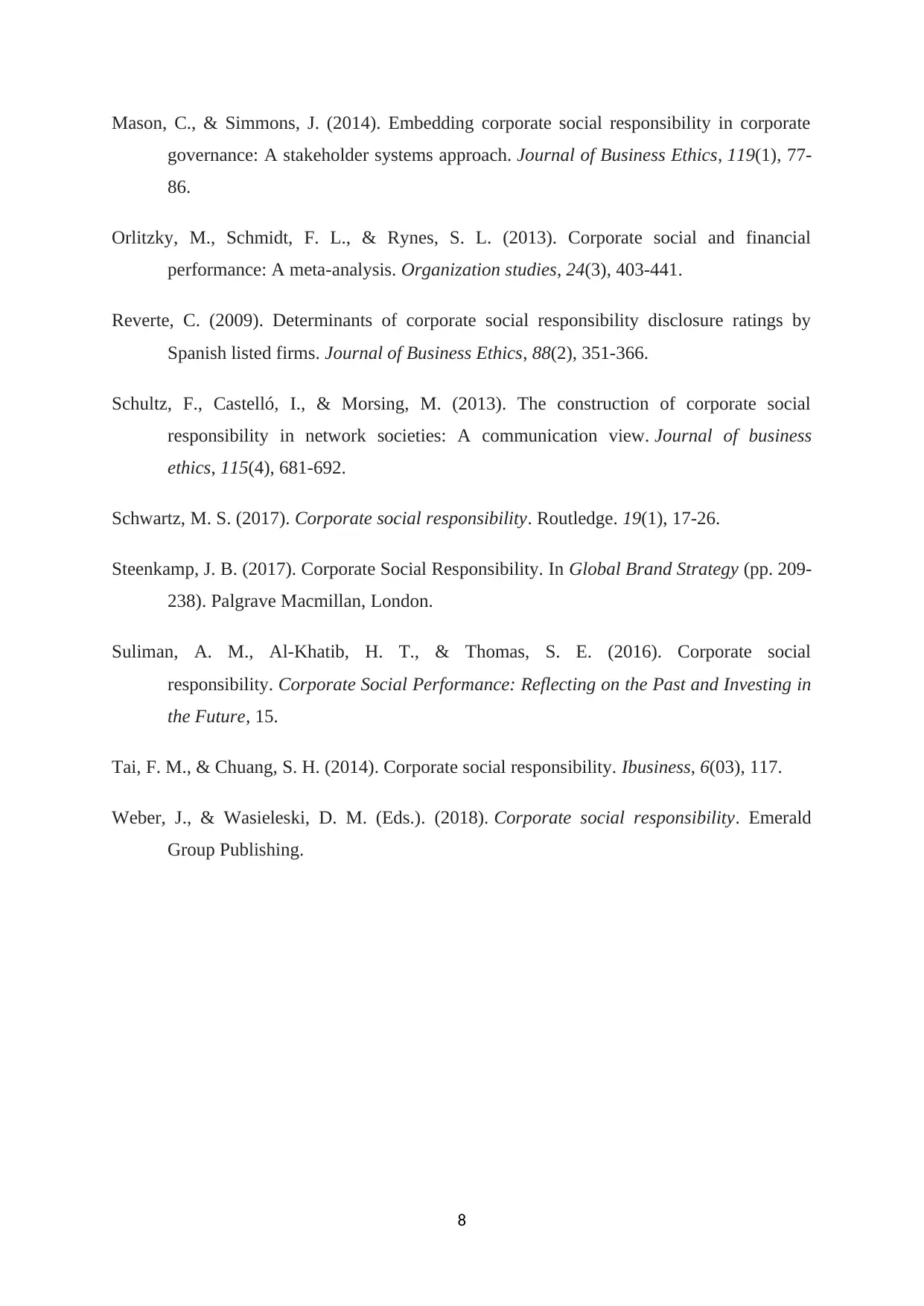
Mason, C., & Simmons, J. (2014). Embedding corporate social responsibility in corporate
governance: A stakeholder systems approach. Journal of Business Ethics, 119(1), 77-
86.
Orlitzky, M., Schmidt, F. L., & Rynes, S. L. (2013). Corporate social and financial
performance: A meta-analysis. Organization studies, 24(3), 403-441.
Reverte, C. (2009). Determinants of corporate social responsibility disclosure ratings by
Spanish listed firms. Journal of Business Ethics, 88(2), 351-366.
Schultz, F., Castelló, I., & Morsing, M. (2013). The construction of corporate social
responsibility in network societies: A communication view. Journal of business
ethics, 115(4), 681-692.
Schwartz, M. S. (2017). Corporate social responsibility. Routledge. 19(1), 17-26.
Steenkamp, J. B. (2017). Corporate Social Responsibility. In Global Brand Strategy (pp. 209-
238). Palgrave Macmillan, London.
Suliman, A. M., Al-Khatib, H. T., & Thomas, S. E. (2016). Corporate social
responsibility. Corporate Social Performance: Reflecting on the Past and Investing in
the Future, 15.
Tai, F. M., & Chuang, S. H. (2014). Corporate social responsibility. Ibusiness, 6(03), 117.
Weber, J., & Wasieleski, D. M. (Eds.). (2018). Corporate social responsibility. Emerald
Group Publishing.
8
governance: A stakeholder systems approach. Journal of Business Ethics, 119(1), 77-
86.
Orlitzky, M., Schmidt, F. L., & Rynes, S. L. (2013). Corporate social and financial
performance: A meta-analysis. Organization studies, 24(3), 403-441.
Reverte, C. (2009). Determinants of corporate social responsibility disclosure ratings by
Spanish listed firms. Journal of Business Ethics, 88(2), 351-366.
Schultz, F., Castelló, I., & Morsing, M. (2013). The construction of corporate social
responsibility in network societies: A communication view. Journal of business
ethics, 115(4), 681-692.
Schwartz, M. S. (2017). Corporate social responsibility. Routledge. 19(1), 17-26.
Steenkamp, J. B. (2017). Corporate Social Responsibility. In Global Brand Strategy (pp. 209-
238). Palgrave Macmillan, London.
Suliman, A. M., Al-Khatib, H. T., & Thomas, S. E. (2016). Corporate social
responsibility. Corporate Social Performance: Reflecting on the Past and Investing in
the Future, 15.
Tai, F. M., & Chuang, S. H. (2014). Corporate social responsibility. Ibusiness, 6(03), 117.
Weber, J., & Wasieleski, D. M. (Eds.). (2018). Corporate social responsibility. Emerald
Group Publishing.
8
1 out of 9
Related Documents
Your All-in-One AI-Powered Toolkit for Academic Success.
+13062052269
info@desklib.com
Available 24*7 on WhatsApp / Email
![[object Object]](/_next/static/media/star-bottom.7253800d.svg)
Unlock your academic potential
© 2024 | Zucol Services PVT LTD | All rights reserved.



